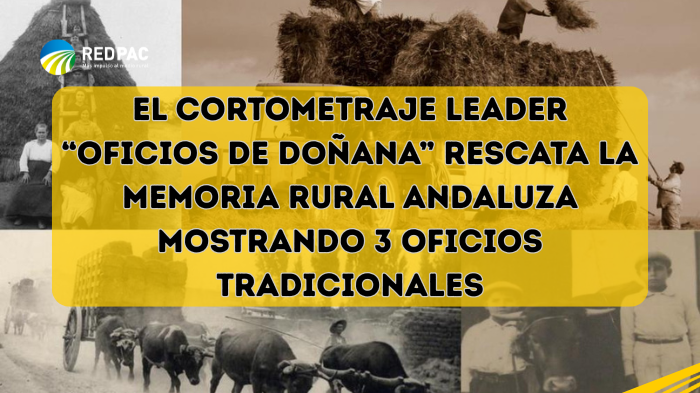
24 de September de 2025
Dinamización rural
Resiliencia y competitividad
The ethnographic piece has been selected at international festivals and is positioned as a candidate for the 2026 Goya Award.
- The ethnographic piece has been selected at international festivals and is positioned as a candidate for the 2026 Goya Award.
- The short film has been co-produced by the women's association Ícara and Ecoperiodismo and covers three traditional trades of Aljarafe-Doñana.
- The project is supported by the Aljarafe-Doñana Local Action Group and the LEADER initiative.
The Seville region of Aljarafe and Doñana has become the setting for the documentary "Oficios de Doñana" (Trades of Doñana) , directed by Ricardo Gamaza. The film, filmed in 4K and premiered in Aznalcázar (Seville) in March 2025, highlights the cultural and environmental richness of the region through three traditional trades at risk of disappearing: the yegüerizos (horse herders), the oxen drivers/carters, and the choceros (choceros) (marsh choceros).
Narrated in the first person by the protagonists themselves, the film connects past and present, showing how these practices, once linked to subsistence, adapt today to new social and economic realities. Academic recognition and international exposure position "Oficios de Doñana" as a benchmark of Andalusian ethnographic cinema , with the possibility of winning the 2026 Goya Award for "Best Documentary Short Film."
Objectives of the documentary
The documentary was born with a clear mission to preserve culture and raise awareness. Its objectives include:
Rescuing the ethnographic memory of the Aljarafe-Doñana region.
To make visible trades at risk of extinction , transmitting the knowledge of their most recent exponents.
Highlighting the link between nature and tradition , showing how local resources (reeds, castanets, horses, oxen) shaped a way of life.
Strengthen the role of women and local cooperation, with the involvement of associations such as the Ícara Women's Association and the Local Action Group (GAL). Aljarafe-Doñana .
To promote Andalusia's rural identity internationally by participating in festivals in Russia, the United Kingdom, Italy, and Spain.
The three main professions
The short documentary has chosen three traditional trades from the region as its protagonists:
The Yegüerizos (horse herders): These are the people dedicated to guarding and guiding the marsh's wild horses in the traditional "saca de las yeguas" (removal of the mares), a ritual that symbolizes the bond between humans and the Doñana ecosystem.
The ox drivers and carters: they are the heirs of a family linked to transport and cargo, who keep alive the tradition of pilgrimages like the Rocío, the most crowded in the Catholic world.
The choceros marismeños: they are the builders of huts with reeds and castanets, the "Estenaza" appear as the last artisans of an ancestral knowledge who transformed precariousness into architectural ingenuity.
Cultural and social impact
Beyond its cinematic value, “Oficios de Doñana” acts as a tool for rural revitalization :
It consolidates the collective identity of the region, reinforcing the sense of belonging.
It promotes territorial cooperation , as it is a project financed with funds from the Andalusian Regional Government and the European Union (EU).
It strengthens intergenerational connections , passing on to young people and visitors a legacy that is in danger of disappearing.
Furthermore, their dissemination on digital platforms (more than 16,000 views on YouTube in just five months) multiplies the reach and ensures that these stories reach beyond their territory.
Financing and entities involved
The work was co-produced by the Ícara Women's Association and Ecoperiodismo , with support from the Aljarafe-Doñana Local Action Group (ADAD) . It is part of the LEADER 2014-2020 initiative , co-financed by the Ministry of Agriculture, Fisheries, Water and Rural Development of the Andalusian Regional Government and the European Agricultural Fund for Rural Development (EAFRD) .
Beyond the awards, the piece demonstrates how culture, cooperation, and the LEADER approach can rescue intangible heritage and project it into the future.









